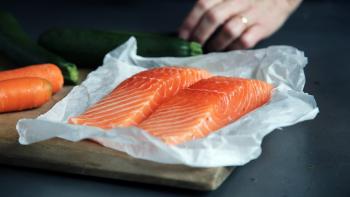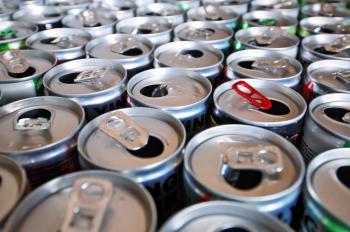News
Latest News List

25 May 2016 - MedicalXpress - Milk and dairy do not promote childhood obesity according to comprehensive new review
A comprehensive review of the scientific evidence over the last 27 years concludes that cow's milk and other dairy products do not play a role in the development of childhood obesity.

25 May 2018 - The Conversation - Obese people enjoy food less than lean people – new study
The researchers in this study were interested in understanding reward-driven eating. Laboratory experiments have shown that obese people are less rewarded by food than people who are lean. This study investigated whether this held true when people were going about their everyday lives.

Diets rich in seafood increase chance of pregnancy
There may be something to that myth about oysters and sex drive after all. Couples who eat a lot of seafood have sex more often and are quicker to achieve a pregnancy, new research has shown.

Young adults need to eat more omega-3 fats
Despite their availability, evidence shows that most people in North America are not getting enough omega-3 fats in their diets. Low levels in our diet means low levels in our bodies. And this may be linked with higher risk for a number of health complications, such as coronary heart disease and depression.

22 May 2018 - BBC - An egg a day to keep the doctor away?
A study of nearly half a million people in China suggests a daily egg may reduce the risk of heart disease and strokes.

22 May 2018 - Science Daily - The antioxidant myth
Dora Il'yasova, associate professor of epidemiology, explains why everything you thought you knew about antioxidants is wrong.

Women need better information about drinking in pregnancy
How much do you know about the guidance on drinking in pregnancy? Most are aware of the “don’t drink” message. But if you’re an expectant mother, or someone who’s job involves giving advice, our new study shows that the abstinence message can feel too simplistic.

Study finds vitamin D supplement decreases wheezing for black preterm infants
African American infants born prematurely are at higher risk for recurrent wheezing. This condition can cause the baby discomfort and is a risk factor for developing asthma later in life. There are no widely-accepted therapies to prevent prematurity-associated wheezing.

16 May 2018 - MedicalXpress - For older adults, a better diet may prevent brain shrinkage
People who eat a diet rich in vegetables, fruit, nuts and fish may have bigger brains, according to a study published in the May 16, 2018, online issue of Neurology, the medical journal of the American Academy of Neurology.

Autism is not linked to eating fish in pregnancy
A major study examining the fish-eating habits of pregnant women has found that they are not linked to autism or autistic traits in their children. Scientists looked at the assumption that mercury exposure during pregnancy is a major cause of autism using evidence from nearly 4,500 women who took part in the Children of the '90s study.

20 May 2018 - Forbes - New Advisory: Eat Fish Twice A Week To Lower Risk Of Heart Attack And Stroke -- What You Should Know
Two servings of oily fish per week can significantly reduce risk of heart attack and stroke, even for those who aren’t eating an especially healthy diet, according to a new science advisory from the American Heart Association (AHA).

How the gut influences neurologic disease
A study published this week in Nature sheds new light on the connection between the gut and the brain, untangling the complex interplay that allows the byproducts of microorganisms living in the gut to influence the progression of neurodegenerative diseases.

15 May 2018 - MedicalXpress - An energy dense diet changes the brain and increases urge to eat
Research by Stephanie Borgland at the University of Calgary shows that giving rats unrestricted access to unhealthy foods for extended periods not only leads to obesity, but also to brain changes that makes food more attractive to them, even when their hunger should be satisfied.

15 May 2018 - MedicalXpress - Some calories more harmful than others
While calories from any food have the potential to increase the risk of obesity and other cardiometabolic diseases, 22 nutrition researchers agree that sugar-sweetened beverages play a unique role in chronic health problems. The disease risk increases even when the beverages are consumed within diets that do not result in weight gain.

15 May 2018 - Nutraingredients - NIH-funded study suggests fish oil, blueberry supplementation linked to improved cognitive performance in older adults
Researchers found that, when participants were given blueberry powder or fish oil capsules, both may boost cognitive performance. Supplementing the two as a combo, however, did not provide an additive benefit as they had expected.

14 May 2018 - The Guardian - Industrial trans fats must be removed from food supply, WHO says
UN health agency says trans fats in snack foods, baked foods and fried foods are responsible for 500,000 deaths each year.

ADHD Symptoms Directly Relate to Binge and Restrictive Eating
Attention-deficit/hyperactivity disorder (ADHD) symptoms have a direct relationship to both binge and restrictive eating, a new study concluded.

10 May 2018 - Science Daily - Prenatal marijuana use can affect infant size, behavior, study finds
Smoking during pregnancy has well-documented negative effects on birth weight in infants and is linked to several childhood health problems. Now, researchers have found that prenatal marijuana use also can have consequences on infants' weight and can influence behavior problems, especially when combined with tobacco use.

2 May 2018 - The Conversation - High-dose vitamin D could be a game changer in treating severe malnutrition
High-dose vitamin D supplements improve weight gain and help with the development of language and motor skills in severely malnourished children, our latest study has found.

Folic acid in pregnancy: MTHFR gene explains why benefits may differ
Recently, it has been claimed that the “one-size-fits-all” approach to folic acid in pregnancy may be wrong and that some women may benefit more from alternative supplements. Specifically, it has been found that forms of a certain gene that vary among people, may affect how the body utilises folic acid.
- <
- 1
- 2
- 3
- 4
- 5
- 6
- 7
- 8
- 9
- 10
- 11
- 12
- 13
- 14
- 15
- 16
- 17
- 18
- 19
- 20
- 21
- 22
- 23
- 24
- 25
- 26
- 27
- 28
- 29
- 30
- 31
- 32
- 33
- 34
- 35
- 36
- 37
- 38
- 39
- 40
- 41
- 42
- 43
- 44
- 45
- 46
- 47
- 48
- 49
- 50
- 51
- 52
- 53
- 54
- 55
- 56
- 57
- 58
- 59
- 60
- 61
- 62
- 63
- 64
- 65
- 66
- 67
- 68
- 69
- 70
- 71
- 72
- 73
- 74
- 75
- 76
- 77
- 78
- 79
- 80
- 81
- 82
- 83
- 84
- 85
- 86
- 87
- 88
- 89
- 90
- 91
- 92
- 93
- 94
- 95
- 96
- 97
- 98
- 99
- 100
- 101
- 102
- 103
- 104
- 105
- 106
- 107
- 108
- 109
- 110
- 111
- 112
- 113
- 114
- 115
- 116
- 117
- 118
- 119
- 120
- 121
- 122
- 123
- 124
- 125
- 126
- 127
- 128
- 129
- 130
- 131
- 132
- 133
- 134
- 135
- 136
- 137
- 138
- 139
- 140
- 141
- 142
- 143
- 144
- 145
- 146
- 147
- 148
- 149
- 150
- 151
- 152
- 153
- 154
- 155
- 156
- 157
- >
